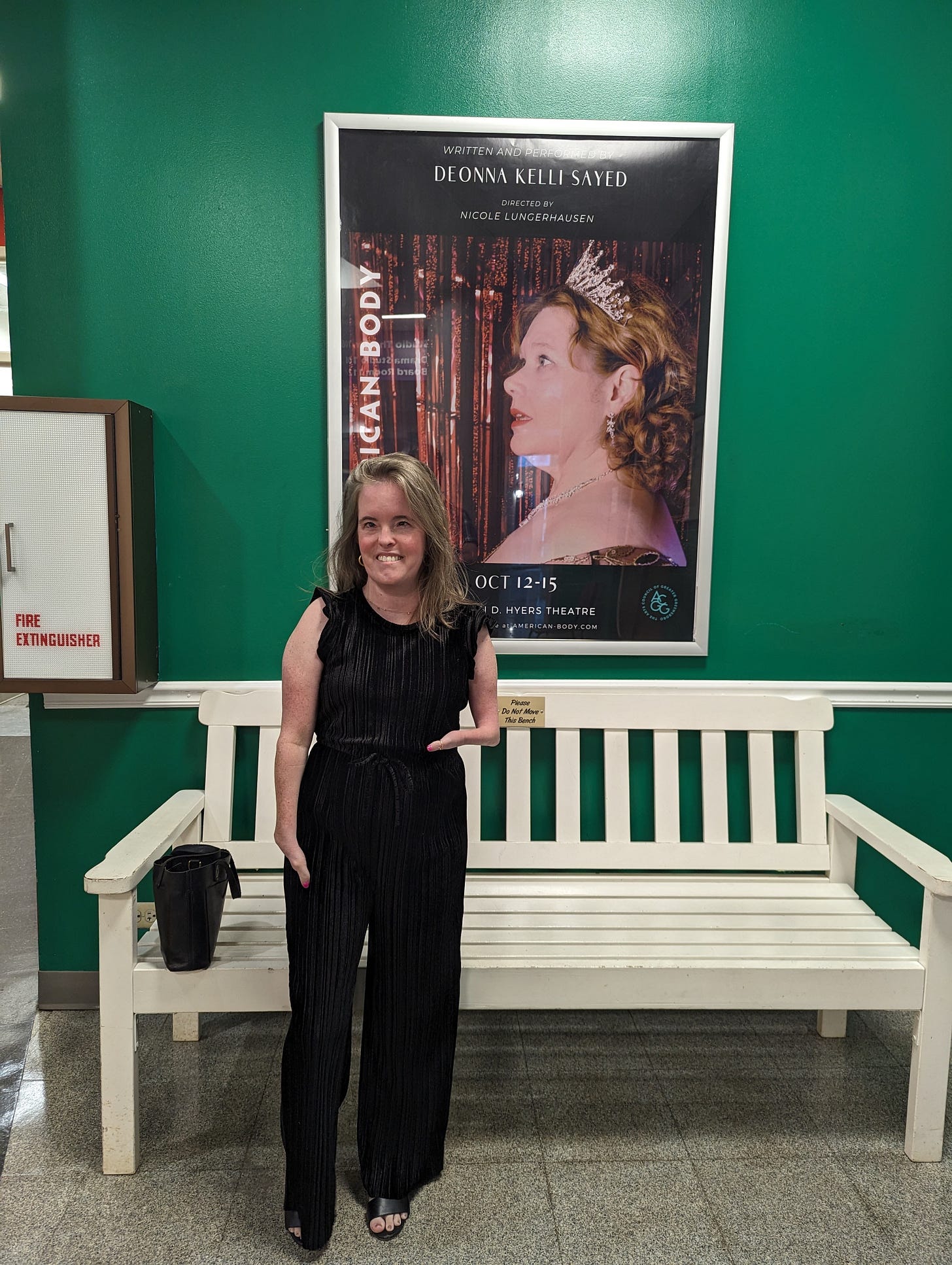Hi writers,
I’m writing this newsletter on the heels of the American Bodies panel that I participated in on the evening of October 9th at the Greensboro Cultural Center. This panel was the brainchild of playwright Deonna Kelli Sayed and was created in tandem with her upcoming solo show American Body, on stage this weekend only (buy tickets here).

A highlight for me was appearing on this panel alongside writer James Tate Hill. I’d read and enjoyed his memoir Blind Man’s Bluff, and admire the work he does to promote audio books as not just an alternative to paper books, but a whole world all their own, and an avenue for a lot of possibilities. I’ve inhabited so many spaces where I was the only person with a visible physical difference, but here I was speaking alongside someone who writes about living with low vision. It felt like community, it felt like abundance. I found myself nodding and chuckling in recognition at many of his answers. And I found myself amazed that the ways in which we both move through the world are still very different, just by virtue of the fact that we have different disabilities. This is why we need so many more stories. All of us, even when we belong in the same community, have something unique to share.
I look forward to more opportunities to share space with writers who are grappling with how to write about physical difference.
The panel was not recorded in full, but below is a 5 minute clip of me answering the question when did you first become aware of how your body impacted your identity and then a segue into a followup question about labels:
Deonna Kelli Sayed was a thoughtful moderator, and at the end of the panel she opened up the discussion to the audience members. As I listened to their stories, about the ways in which they have grappled with or found joy in their bodies, I was struck by how starved we are for conversations like this.
She asked some really great questions, so I’ll leave them here for you to think about:
When did you first become aware of how your body impacted your identity?
We use so many labels these days to describe identities: fat, disabled, queer, trans, blind, White, Black, etc. What are the limitations of these labels? Likewise, how does language make things possible - or limit possibility?
How do specific political policies impact your feelings about belonging in this country (when it comes to race/gender/disability/body etc)?
When do you experience joy in your body?
Many thanks to everyone who showed up, and to Deonna and the other panelists for their thoughtful engagement with this important topic.
Want to take a class with me?

Registration closes on October 15th for the mini version of my Writing the Body class that I’m teaching as a part of visual artist Jean Gray Mohs’ Object as Vessel/Process as Catharsis exhibit taking place October 16th - 28th, 2023 at the Greensboro Project Space.
Writing the Body will take place on Zoom October 24th from 6:00-7:30pm ET (see above for the class description) and it’s open to adult writers of any genre or experience level. The cost is $25 sliding scale, which means depending on your current financial resources you can choose to pay anywhere from $0-$25 for this seminar. For those who have taken this class before, some of the material may be repeated, but don’t let that stop you - there will be new faces to meet and to learn from. Register here. (A note on the registration form: it contains registration for the various offerings that are all a part of this exhibit, but it only takes a few minutes to fill out.)
I sometimes offer poems on my Instagram and this particular one has been giving me some comfort these days, so I wanted to share it with you.
I’ve been thinking about how we sometimes do ourselves a disservice when we over-complicate how we think about poems. I was an English major, so I grew up learning that in order to engage fully with poetry I had to diagram it and understand it and pick it apart, analyze it properly to prove my intelligence, to prove that I was in the club. But, looking back, that never gave me much pleasure, and it never made me feel — really — that I was engaging with poems the way I wanted to.
Now that I’m older and have more confidence in my own intelligence I want to scream from the rooftops that poetry is meant to be enjoyed. So I invite you to read this and let it wash over you. Ask yourself how it makes you feel. Share it with a friend if it moves you. And enjoy it.

Let’s do some writing now, shall we? Each month I offer a writing prompt for my paid subscribers. These prompts are meant to jump start creative thinking and give guidance to your writing practice. Let’s get right to it!
Let’s begin:
Let’s take three minutes — and no more than that — for prep. Before we work with prompts, especially if we are working outside of the classroom, we should take time to prepare. This pre-writing process is important because it sets the stage for the writing you're going to do.



